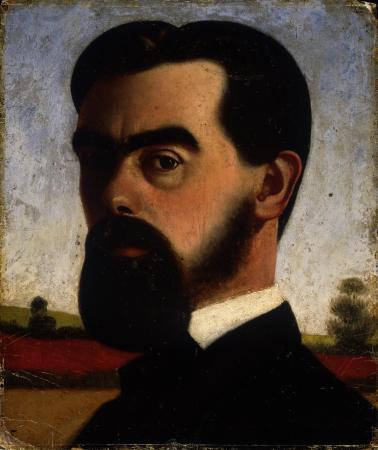A Psalm of Montreal http://www.geocities.com/~bblair/011204.htm, st. 1 (1884)
Samuel Butler Quotes
The Iliad of Homer, Rendered into English Prose (1898), Book XXII
Thought and Word, vi
The Note-Books of Samuel Butler (1912), Part VII - On the Making of Music, Pictures, and Books
Early Art
The Note-Books of Samuel Butler (1912), Part IX - A Painter's Views on Painting
“If I die prematurely, at any rate I shall be saved from being bored by my own success.”
Compensation
The Note-Books of Samuel Butler (1912), Part X - The Position of a HomoUnius Libri
“The man who lets himself be bored is even more contemptible than the bore.”
The Fair Haven http://www.gutenberg.org/dirs/etext04/fhvn10h.htm, Memoir of the Late John Pickard Owen, Ch. 3 (1873)
Choice
The Note-Books of Samuel Butler (1912), Part XX - First Principles
Source: Erewhon (1872), Ch. 25
Entertaining Angels
The Note-Books of Samuel Butler (1912), Part X - The Position of a HomoUnius Libri
Source: Erewhon (1872), Ch. 9
Truth, vii
The Note-Books of Samuel Butler (1912), Part XIX - Truth and Convenience
Birth and Death, ii
The Note-Books of Samuel Butler (1912), Part I - Lord, What is Man?
Truth, ii
The Note-Books of Samuel Butler (1912), Part XIX - Truth and Convenience
Personal Identity
The Note-Books of Samuel Butler (1912), Part IV - Memory and Design
Vice and Virtue, iii
The Note-Books of Samuel Butler (1912), Part II - Elementary Morality
Thinking
The Note-Books of Samuel Butler (1912), Part V - Vibrations
Agonising
The Note-Books of Samuel Butler (1912), Part VII - On the Making of Music, Pictures, and Books
The Art of Covery
The Note-Books of Samuel Butler (1912), Part XI - Cash and Credit
Ramblings In Cheapside (1890)
“Time is the only true purgatory.”
Purgatory
The Note-Books of Samuel Butler (1912), Part XIV - Higgledy-Piggledy
Moral Influence
The Note-Books of Samuel Butler (1912), Part VI - Mind and Matter
“The devil tempted Christ; yes, but it was Christ who tempted the devil to tempt him.”
Further Extracts from the Note-Books of Samuel Butler http://books.google.com/books?id=zltaAAAAMAAJ&q=%22The+devil+tempted+Christ+yes+but+it+was+Christ+who+tempted+the+devil+to+tempt+him%22&pg=PA76#v=onepage, compiled and edited by A.T. Bartholomew (1934), p. 76
The Art of Propagating Opinion
The Note-Books of Samuel Butler (1912), Part X - The Position of a HomoUnius Libri
Source: The Way of All Flesh (1903), Ch. 5
Sin
The Note-Books of Samuel Butler (1912), Part II - Elementary Morality
Making Notes
The Note-Books of Samuel Butler (1912), Part VII - On the Making of Music, Pictures, and Books
“The world will, in the end, follow only those who have despised as well as served it.”
The World
The Note-Books of Samuel Butler (1912), Part XXIV - The Life of the World to Come
Populus Vult
The Note-Books of Samuel Butler (1912), Part XII - The Enfant Terrible of Literature
Posthumous Life, i
The Note-Books of Samuel Butler (1912), Part XXIV - The Life of the World to Come
“Life is the art of drawing sufficient conclusions from insufficient premises.”
Life, ix
The Note-Books of Samuel Butler (1912), Part I - Lord, What is Man?
Source: Erewhon (1872), Ch. 18
Vice and Virtue, ii
The Note-Books of Samuel Butler (1912), Part II - Elementary Morality
“You can do very little with faith, but you can do nothing without it.”
Faith, ii
The Note-Books of Samuel Butler (1912), Part XXI - Rebelliousness
New Ideas
The Note-Books of Samuel Butler (1912), Part VII - On the Making of Music, Pictures, and Books
Future and Past
The Note-Books of Samuel Butler (1912), Part XIV - Higgledy-Piggledy
“Truth consists not in never lying but in knowing when to lie and when not to do so.”
Falsehood, i
The Note-Books of Samuel Butler (1912), Part XIX - Truth and Convenience
The Credulous Eye
The Note-Books of Samuel Butler (1912), Part IX - A Painter's Views on Painting
Ramblings In Cheapside (1890)
Adam and Eve
The Note-Books of Samuel Butler (1912), Part XVI - Written Sketches
Reputation
The Note-Books of Samuel Butler (1912), Part XIV - Higgledy-Piggledy
“The best liar is he who makes the smallest amount of lying go the longest way.”
Ch. 39 http://books.google.com/books?id=wZAEAQAAIAAJ&q=%22The+best+liar+is+he+who+makes+the+smallest+amount+of+lying+go+the+longest+way%22&pg=PA190#v=onepage
The Way of All Flesh (1903)
“If a man would get hold of the public era, he must pay, marry, or fight.”
Ramblings In Cheapside (1890)
God and Man
The Note-Books of Samuel Butler (1912), Part II - Elementary Morality
Seeing
The Note-Books of Samuel Butler (1912), Part IX - A Painter's Views on Painting
Samuel Butler's Notebooks http://books.google.com/books?id=cjk3AAAAIAAJ&q=%22One+of+the+first+businesses+of+a+sensible+man+is+to+know+when+he+is+beaten+and+to+leave+off+fighting+at+once%22&pg=PA186#v=onepage (1951)
Source: The Way of All Flesh (1903), Ch. 5
The World, ii
The Note-Books of Samuel Butler (1912), Part I - Lord, What is Man?
